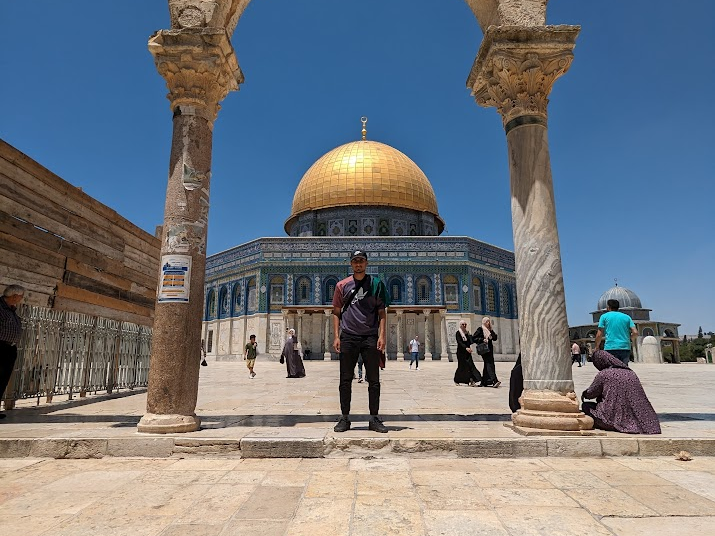Planning
During the summer holidays, students within Jamia Ahmadiyya are required to perform Waqf-e-Arzi for a minimum of two weeks. This provides the opportunity for students to travel to distant lands where Jamaat Ahmadiyya is established and offer their services to the Community in various capacities. Due to my interest in the Arabic language, I sought Huzoor’s (may Allah be his Helper) permission to perform Waqf-e-Arzi in Palestine. Known as ‘the Land of the Prophets,’ Palestine has a rich history of prophets from the Abrahamic faiths who roamed and fulfilled their missions in the region. The Jama’at in Palestine is also one of the first Jamaats established in the Arab region. After receiving Huzoor’s (may Allah be his helper) permission and blessings, I booked my tickets and planned my trip with a junior student native to the area.

From One Jalsa to Another
The week prior to my departure coincided with Jalsa Salana Canada, where we had the opportunity not only to attend but also to serve the guests of the Promised Messiah (peace be on him) who attended. Following a spiritually rejuvenating week, I departed the very next day for Palestine. Upon arriving at the Mahmood Mosque, I was informed that preparations for Jalsa Salana Kababir had already begun. It was thrilling to attend two Jalsas back-to-back and observe how different cultures conduct the same convention.
Jalsa Kababir featured many unique elements. Held from Thursday through Saturday, Thursday was dedicated to Jewish and international guests with sessions held entirely in Hebrew. The Friday and Saturday sessions were for Arab Ahmadis. Due to the intense summer heat in Palestine, Jalsa proceedings took place in the evenings, ending with Maghrib and Isha prayers. The Jalsa opened with a flag-hoisting ceremony, and, as is tradition, a specific Qaseedah was collectively recited for the occasion. The langar meals differed from the traditional ‘Aloo gosht’ and ‘Daal Chaval,’ as local Palestinian dishes were served.
As an attendee, I benefited spiritually from the various speeches, and, as a student of Arabic, I also had the opportunity to improve my comprehension by listening to the eloquent addresses of Arab scholars and speakers.

Sightseeing
Palestine is rich with historical and religiously significant sites. Following Jalsa, I joined Arab guests for sightseeing. Visiting Jerusalem, “the holy land,” allowed me to experience stories from the life of Hazrat Isa (peace be on him), the Holy Prophet (peace and blessings of Allah be on him), and other Islamic events coming to life. The city’s preservation was remarkable, evoking the feeling of traveling back in time. Every corner had its own story, enriching the experience and offering much to learn.

Khidmat (Service)
During the initial part of our stay, we led the five daily prayers at the Mahmood Mosque and gave duroos (lessons) after Maghrib Salat. We also assisted an elderly Jama’at member with reorganizing and restructuring the mosque library. The missionary in Kababir, Imaduddin Al-Masri, arranged for us to hold a Talim-o-Tarbiyyat camp for the Atfal in the West Bank region. Many Palestinians in this area face harsh conditions and are dispersed, so Atfal in the West Bank rarely get the chance to participate in Jama’at activities or learn about Ahmadiyyat. Our primary objective was to educate them on the teachings and history of Islam and Ahmadiyyat.
We spent a week at the Dar-ul-Amn Mosque in Tulkarm, where a total of 11 Atfal participated, along with two Khuddam who helped prepare meals. Accompanied by a Jamia student fluent in Arabic, I had the best opportunity yet to improve my Arabic skills, as most members from the West Bank region did not speak English.
The camp included educational sessions and various activities. The Atfal were taught religious knowledge, such as tajweed, Hifz-e-Qur’an, Hadith (pertaining to morals), and Jama’at history. We organized interactive quiz competitions recorded by Khuddam in Kababir to test their knowledge. By the end of the camp, we were surprised at how much they had progressed in just a week, going from not knowing the names of the Khulafa-e-Ahmadiyya to naming five books of the Promised Messiah (peace be on him) from memory.
We also held sports sessions, where Atfal particularly enjoyed soccer, and even took them to a water park one day, where they had a great time swimming.

Overall Impression & Conclusion
Through my interactions with the Jama’at members in Palestine, I gained a deep appreciation for Akhlaq (moral conduct) and its impact on others. I met three young Khuddam who had recently taken Bai’at at Huzoor’s hand during Jalsa Salana UK. They accepted Ahmadiyyat because of the brotherhood displayed by Jama’at members. This aspect of Tabligh (preaching) through a public display of Islamic values is sometimes overlooked in Jamia, where the focus is often on discourse and studying.
Murabbi Imaduddin Sahib taught me an invaluable lesson as a Waqf-e-Zindagi: to integrate personal life with service to Jama’at, a true embodiment of what being a Waqf-e-Zindagi means. I witnessed this firsthand in how his personal activities always seemed connected to Tarbiyyat or Tabligh.
My time in Palestine was unforgettable, immersing me in a culture vastly different from my own and challenging me to speak a language I was just learning. Meeting individuals with unwavering love for Khilafat and dedication to Ahmadiyyat, despite never having met Huzoor (may Allah be his Helper), was inspiring.
In the end, I request readers to pray for the Jama’at in Palestine—that Allah may continue to shower His blessings upon its members and protect them from trials and tribulations over their land. Ameen.



